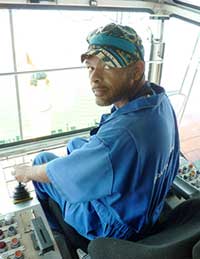CCO Operator Profiles - Simeon Crews
 Simeon Crews has been CCO certified to operate all types of mobile cranes since 1999, but he has been operating crawler, hammerhead, luffing jib, gantry, and other types of cranes for almost 32 years. Over the years he’s done almost everything that can be done with a crane, including heavy construction, driving piles, running draglines, lifting clam buckets, drop balling, loading rail cars, and now loading and unloading ships.
Simeon Crews has been CCO certified to operate all types of mobile cranes since 1999, but he has been operating crawler, hammerhead, luffing jib, gantry, and other types of cranes for almost 32 years. Over the years he’s done almost everything that can be done with a crane, including heavy construction, driving piles, running draglines, lifting clam buckets, drop balling, loading rail cars, and now loading and unloading ships.
He got his initial training through an apprenticeship program with I.U.O.E. Local 18 in Dayton, Ohio. There he discovered that he had hand, eye, and foot coordination required to operate cranes, even though the crane he was learning on was “old and beat up.” He has remained a “permanent student” throughout his career, taking classes through the union whenever possible. He likes learning the technical side of crane operation because it gives him something to fall back on when contractors ask him to do something unsafe. He can explain why he shouldn’t do it, whether that means showing them load charts, OSHA requirements, or the operator’s manual, and his CCO certification backs up that he knows what he’s talking about.
With all of his training, he was already well prepared to take the certification exams when CCO certification was introduced. Earning his CCO, though, made him “much more aware of why and why not certain actions are legal, dangerous, or safe.” Plus, he says, “Others have confidence in my judgment because my CCO certification shows that I know my machine’s limitations and the boundaries of its operating radius, and that I won’t do anything that’s unsafe.”
He now works at a Jacksonville, Florida, seaport. “Based on my previous experience, safety record, and CCO certification, I was offered a job on the port loading and unloading ships. I’ve been there for nine years.” He initially used the port’s mobile cranes then graduated to gantry cranes and a 112-ton Clyde heavy-lift Whirley. At the helm of a gantry crane, he’s been clocked loading or unloading over 60 containers an hour, better than one a minute. Today, he says, “My fellow employees want to work with and under the ‘wise old man’ who knows what he is talking about and has a good safety record.”
Although the port doesn’t require CCO certification, he says, “I would recommend CCO certification to supervisors and co-workers because this is a nationally recognized credential respected by government, unions, and private corporations. After they saw what I could do, they hired a friend of mine who has similar experience and is also CCO certified.”
He sees the biggest challenge today for operators is keeping up with the increasing complexity of the cranes. He says, “Older cranes were more robust, so operators could push them to their limits without them breaking, but that’s not the case today. Operators therefore need to understand the latest crane designs, functions, and uses, and CCO certification ensures that they do.” He goes on to say, “CCO certification is a great equalizer because it reduces employers’ prejudice and opens up opportunities to demographic groups that might not otherwise be given the opportunity to operate cranes. If you’re CCO certified, you have evidence that you know what you’re doing.”
When not operating cranes, Simeon enjoys riding his motorcycle and serving as a community Board member.